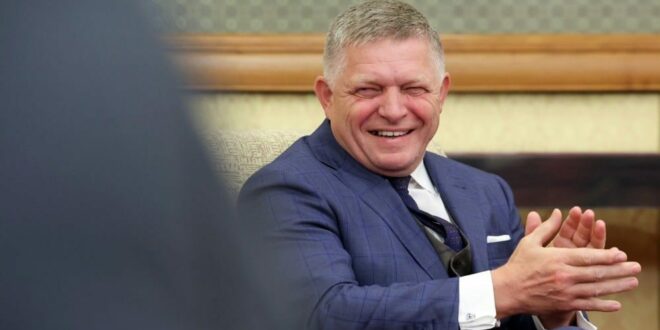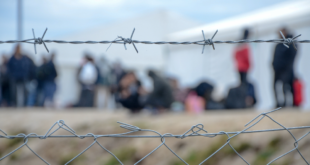Slovakia’s prime minister, Robert Fico, cut a lonely figure in Beijing this week as the only EU leader to attend China’s World War II anniversary events, standing in a line-up alongside Xi Jinping, Vladimir Putin, Kim Jong-un and other authoritarian rulers – an image analysts described as a snapshot of a world order without the West. His bilateral meeting with Putin offered little in the way of surprises. After trailing a “very unpleasant question”, Fico instead merely asked: “How are you?” To which Putin replied: “I am alive, and that is good.” The exchange set the tone for a carefully choreographed, cordial meeting in which the Slovak leader thanked the Russian president for past hospitality and assured him that Bratislava sought “normalisation” of ties, not rupture. As a sign of this, Slovakia has resumed issuing visas for Russian tourists.
Fico also promised the Russian leader his country would resist Brussels’ plan to phase out Russian energy, arguing that both Slovakia and Europe would be harmed by giving it up. He praised the TurkStream gas pipeline, and even floated the idea of Russian firms working alongside the US company Westinghouse on new Slovak nuclear reactors. Putin hailed Slovakia’s “independent” foreign policy and urged it to stop reverse flows of gas and electricity to Ukraine. The Slovak premier went further, condemning recent Ukrainian strikes on Russian oil infrastructure and vowing to raise the matter directly with Ukrainian President Volodymyr Zelensky when the two meet in Uzhhorod on Friday. What Fico failed to mention were Russia’s war crimes in Ukraine and its deliberate targeting of civilian infrastructure and energy. Instead, when Putin repeated Kremlin propaganda and blamed the West for starting the conflict, the Slovak leader listened in silence. Back home, the opposition branded the Beijing trip a betrayal, accusing Fico of acting as Moscow’s envoy while neglecting Slovakia’s worsening public finances.
Slovakia’s director of intelligence, Pavol Gaspar, sparked fresh controversy after crashing his yellow Dodge Challenger in Nitra over the weekend, injuring a 14-year-old girl. Police said both drivers tested negative for alcohol, but witnesses reported Gaspar was overtaking recklessly before striking a Volkswagen carrying the teenager. His car was thrown into a lamp post, though he escaped unhurt. The incident quickly escalated after it emerged that Gaspar had not declared the Dodge in his official asset disclosures. He first insisted he had bought it years ago with his savings, but later said it was registered to a company in which he once worked. Opposition parties accused him of concealing luxury assets and renewed calls for his resignation. The affair has again shone a spotlight on Gaspar’s personal image and political connections. His father Tibor, once the president of police and now deputy parliamentary speaker for the ruling Smer party, is facing charges in a major corruption case. On his arms, the younger Gaspar has tattoos of both his father and Tom Hagen, the mafia consigliere from “The Godfather”. Asked about the crash, Tibor Gaspar told a TV channel his son would “have to bear the appropriate punishment” if guilty, but on Facebook he attacked critics and defended his son’s purchase of the car. Gaspar’s rapid ascent has long been contentious. Despite limited experience as a lawyer and investigator, he was appointed deputy intelligence chief in 2023 after being put forward by PM Fico, and in August 2024 was confirmed as director by President Peter Pellegrini, a Fico ally. Transparency campaigners have questioned how he could afford multiple properties on a modest public salary at such a young age, while opposition parties argue the accident proves he is unfit for the role.
Trump backs maintaining US troops in Poland; NATO’s biggest defence spender
Poland’s new populist president, the right-wing historian Karol Nawrocki, was welcomed to the White House on Wednesday, where he was treated to a military flyover and an Oval Office sit-down with the US president. Donald Trump sees Nawrocki as a kindred spirit and backed him in the June election as he beat the candidate of the ruling coalition of Polish Prime Minister Donald Tusk. A period of awkward cohabitation is now the reality in Poland – a taste of which came as Nawrocki refused to follow the practice of having a representative of the government participate in presidential meetings with foreign leaders. Where the two centres of power in Poland are in agreement is on keeping the US tied into the country’s security architecture amid the war in next-door Ukraine, and Nawrocki received confirmation that the US would maintain a strong presence in Poland and could even increase the number of troops it has stationed there. “We’ll put more there if they want,” Trump told Nawrocki in the Oval Office. “We’re with Poland all the way, and we’ll help Poland protect itself.” In February, the Polish government said a total of about 10,000 US troops are stationed in Poland, primarily as part of a rotational presence.
Nawrocki went into the Oval Office meeting buoyed by new data that showed Poland is NATO’s biggest relative spender on defence. That would be music to the ears of a US president who has made forcing NATO allies to lift their defence spending a major plank of his foreign policy. NATO estimates that Poland will spend the equivalent of 4.5 per cent of GDP on defence this year, which is up from 2.2 per cent a decade ago. Furthermore, that increased spending has been focused on equipment, including US kit, rather than, say, defence-related capabilities like infrastructure and logistics. Poland devotes well over half (54.4 per cent) of its defence budget to equipment, which is also the highest figure in NATO. In terms of nominal spending, Poland has NATO’s sixth-largest defence budget this year, at 44.3 billion dollars. This is predicted to be the first year that all 32 NATO members will meet the alliance’s spending target of 2 per cent of GDP; Trump is pushing for 5 per cent. Since Russia’s full-scale invasion of neighbouring Ukraine in 2022, Poland has accelerated the modernisation of its armed forces to strengthen NATO’s eastern flank. With an additional 4 billion dollars in US loan guarantees to help fund Poland’s military modernisation agreed in July, the US has, since 2022, provided Warsaw with about 15 billion dollars of loans and loan guarantees to finance arms purchases programs, including Patriot air defence systems, the HIMARS rocket system and Apache helicopters.
Crutch attack against former Czech PM Babis; fake coalitions under the spotlight
Former Czech PM and opposition leader Andrej Babis was slightly injured on Monday when a 64-year-old man hit him on the head with a crutch during a campaign rally in the Moravian-Silesian region, in the country’s north-east. Another woman reportedly also suffered a blow as a result of the assault. Babis was taken to hospital for checks and the ANO chairman cancelled the following day’s program. The attacker was arrested on the spot and, later apologising and wishing 71-year-old Babis a happy birthday on Tuesday, admitted he does “not understand at all that I was capable of something like that in public”, but that he was specifically bothered when people “endlessly lie”. The incident comes as the campaign for the general election, scheduled for October 3-4, entered its so-called “hot phase”, with parties and candidates out in force to drum up support and win over the vast pool of undecided voters for that few extra percentage points which could make a huge difference come election day. Top government figures, including PM Petr Fiala and Interior Minister Vit Rakusan, promptly condemned the attack, wishing Babis a speedy recovery and saying there was no place for violence in politics. The act “is a direct consequence of their campaign based on fear and division,” lashed out ANO’s Alena Schillerova, while the party’s number two Karel Havlicek warned that “next time, it could be worse”. While the act and injuries suffered are relatively mild, the incident appears symptomatic of a virulent and heated campaign that comes on the heels of years of polarising and insulting rhetoric between the government and the opposition, especially between Babis’s ANO and Fiala’s ruling SPOLU coalition.
The Interior Ministry announced earlier this week that regional courts across Czechia have all rejected claims that sought to cancel the registration of some parties’ candidate lists ahead of the October election. In recent weeks, the non-parliamentary movements Volt Czechia and Czech Republic In 1st Place filed lawsuits in several regions to review the candidate lists of the far-right SPD and the communist Stacilo!, whom they argue are unofficial coalition movements masquerading as individual parties. The Oath movement filed a similar lawsuit against the Pirates. Under Czech electoral law, parties must win at least 5 per cent of the votes to enter parliament, while two-party coalitions need 8 per cent and larger ones – like the ruling SPOLU coalition – 11 per cent. But some parties appear to be manoeuvring in a grey zone to bypass those requirements: although running under a single banner, the Pirates have accepted Green candidates on their lists, while SPD is leading a campaign with the involvement of three smaller far-right parties; Stacilo!, meanwhile, has representatives of four different parties on its lists on top of joining forces with the Social Democrats ahead of next month’s general election. “Despite the fact that the Stacilo! movement’s candidate list violates the law, as it is not designated as a coalition list, the regional court did not proceed to cancel the registration,” a court in Brno ruled. Legal experts believe the court’s reasoning leaves the door open for future examination of the matter by the Constitutional Court.
Hungarians still strong EU supporters; Fidesz takes aim at alleged opposition tax plans
Despite relentless government propaganda attacking the EU, Hungarians remain strong supporters of the bloc. A Eurobarometer survey released this week, based on data collected in May, revealed that 80 per cent of Hungarians believe the EU should act more united in tackling global challenges. Furthermore, 82 per cent think the EU should be equipped with more tools to effectively respond to such challenges. Interestingly, Hungarians overwhelmingly support linking EU financial transfers to rule-of-law conditions – a policy that has negatively impacted Hungary in recent years, with the country losing billions in such funds. A striking 82 per cent of respondents (only 3 points less than the EU average) believe that financial transfers should be tied to whether governments respect the rule of law and democratic principles, while only 17 per cent oppose this idea. Where Hungarians diverge somewhat from the EU average is in their expectations of the union. Their priorities are more focused on economic prosperity, competitiveness and food security, rather than on security and defence issues. Interestingly, migration no longer ranks among their top concerns. Overall, 45 per cent of Hungarians have a positive image of the EU while 42 per cent hold a neutral view -– a figure where, perhaps, the effects of Orban’s propaganda can be seen the most. Nevertheless, 75 per cent acknowledge that Hungary has benefited from its EU membership. When asked how, the most common response was that it created new employment opportunities for Hungarians – likely referring to jobs abroad.
The governing Fidesz party is desperately trying to identify the Achilles’ heel of its rival, the upcoming Tisza party of Peter Magyar, and has recently zeroed in on its alleged tax policies. The government-aligned Index.hu published a document claiming that the opposition party is planning to reintroduce progressive taxation in place of the current flat-rate income tax, leading to tax hikes for most wage earners. Although still officially on vacation, PM Viktor Orban has already begun fear-mongering about a so-called “Tisza tax”, which, he claims, would significantly increase income taxes for the middle class. The opposition party felt compelled to respond by publishing a counter-document showing that their proposed tax reform would, in fact, reduce taxes for minimum wage earners from the current 15 per cent to 9 per cent, while the current level would remain for the middle and upper-middle class. At the same time, the party proposes introducing a special 1 per cent wealth tax on individuals with assets above 5 billion forints (12.7 million euros). According to the party’s calculations, revenue from this wealth tax would offset the loss caused by tax cuts for lower income earners, although experts say that collecting this tax from the richest (and often Fidesz-close individuals) would be a challenge. The debate was further intensified by the leak of a recorded conversation involving MEP and Tisza vice-chairman Zoltan Tarr, who said in a closed-door meeting: “First we have to win the elections, and then we can talk about all our projects.” Fidesz-controlled media declared it an admission that tax hikes are on the cards.
 Eurasia Press & News
Eurasia Press & News




